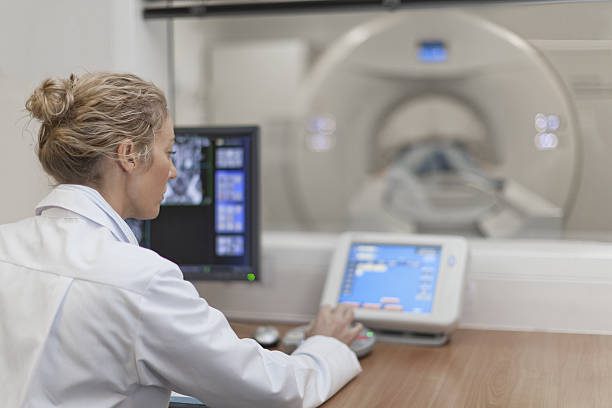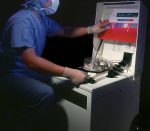
| MRI Technician Key Stats | |
|---|---|
| Education | 1-2 Years |
| Job Outlook | 11% |
Magnetic Resonance Imaging (MRI) Technicians are specialized Radiologic Technicians that handle sophisticated medical equipment in order to create images of a patient’s body.
The images are formed by radio frequencies and magnetic fields and show detailed structure of a patient’s body tissues.
These special images help Physicians diagnose or rule out potential health problems.
MRI Technicians help run the heavy equipment and handle the imaging procedures.
They are skilled in not only running the scans, but helping patients overcome the MRI procedure because the process can be an uncomfortable experience for some.
Patients have to remain still in an enclosed space for the duration of the scan while the machine makes some unforgettable sounds and noises.
Patients who are claustrophobic may also have a hard time getting through the process as some MRI machines confine people in into a very small are.
An experienced MRI Technician will need to get the procedure done in a reasonable amount of time and be able to coach the patient throughout the scan.
These professionals can work out of clinics, hospitals or diagnostic labs and are trained to handle the sophisticated equipment.
Table of Contents
Education Requirements to Become an MRI Technician
People who are looking into a possible career in the medical field and looking for ways on how to become an MRI Technician need to look into continuing their education.
Candidates need at least two years of continued education with a focus on Radiology.
Some trade schools and community colleges offer an MRI Technology curriculum where candidates who want to become an MRI Technician can work towards certification or an Associate’s degree.
In an MRI Associate’s Degree Program, students will learn a variety of information regarding medical topics such as Pathology and Anatomy.
In addition, they will learn the basics needed in order to perform their job as an MRI Technician.
They will take classes that teach them about patient care and MRI procedures and use.
MRI Technology Programs are also a great choice because they provide people who want to become an MRI Technician with necessary real life training.
This hands-on experience will teach candidates what it is like to be an MRI Technician in which they will work with patients and learn how to use the sophisticated equipment.
In addition to completing an MRI Technology program, candidates will need to seek licensure in order to become an MRI Technician.
This requirement however, does vary by state.
In the states that enforce certification, candidates are able to take a certification exam accredited by the American Registry of Radiologic Technologists (ARRT).
Visit: American Registry of Radiologic Technologists for specific information.
MRI Technician Job Description
MRI Technicians must have solid communication skills in order to follow instructions from Physicians and relay procedures to patients.
The following are common procedures and tasks an MRI Technician follows and performs:
- Instruct patients regarding where to lie on MRI stretcher
- Communicate procedure to patients and provide instructions for them
- Use MRI scanner in order to perform procedure and take images of patients body
- Record information such as diagnostic images gathered from the MRI scan
- Physically move equipment or patients if needed in order to position everything correctly
MRI Technicians use sophisticated equipment in order to scan 3D images of a patient’s body and internal organs.
They are not only trained in operating MRI equipment and documenting the results, they provide coaching for patients who are claustrophobic or anxious about going through the procedure.
They use their communication skills in order to inform the patient about the procedure and give specific instructions on where to lie down on the equipment.
MRI Technician Salary and Career Path
The outlook for any career in the medical field is considered to be strong throughout the next decade.
The demand for MRI Technicians is expected to be even higher because of the improvements in technology.
The Bureau of Labor Statistics states that the increase in job openings for MRI Technicians will increase by 17% in the coming decade.
MRI machines are also undergoing a decrease in cost making them more affordable for private firms.
This decrease in cost will result in a hiring increase for the MRI Technicians that run them.
In addition, the demand for MRI Technicians is expected to grow because of the increase in the aging population who require more medical attention.
![]() The below information is based on the 2023 BLS national averages.
The below information is based on the 2023 BLS national averages.
National Average Salary
$75,250Average Salary by State
| State | Avg. Annual Salary |
|---|---|
| Alabama | $56,670 |
| Alaska | $87,180 |
| Arizona | $79,860 |
| Arkansas | $59,470 |
| California | $103,150 |
| Colorado | $80,140 |
| Connecticut | $85,380 |
| Delaware | $77,350 |
| District of Columbia | $89,740 |
| Florida | $65,640 |
| Georgia | $67,880 |
| Hawaii | $92,170 |
| Idaho | $72,890 |
| Illinois | $74,040 |
| Indiana | $70,550 |
| Iowa | $62,550 |
| Kansas | $67,140 |
| Kentucky | $63,520 |
| Louisiana | $61,480 |
| Maine | $72,210 |
| Maryland | $78,270 |
| Massachusetts | $93,270 |
| Michigan | $68,150 |
| Minnesota | $78,730 |
| Mississippi | $53,660 |
| Missouri | $66,560 |
| Montana | $68,820 |
| Nebraska | $67,530 |
| Nevada | $86,570 |
| New Hampshire | $78,780 |
| New Jersey | $82,800 |
| New Mexico | $71,940 |
| New York | $85,330 |
| North Carolina | $67,500 |
| North Dakota | $68,750 |
| Ohio | $68,140 |
| Oklahoma | $65,810 |
| Oregon | $90,610 |
| Pennsylvania | $69,420 |
| Rhode Island | $83,230 |
| South Carolina | $62,980 |
| South Dakota | $63,590 |
| Tennessee | $62,710 |
| Texas | $72,470 |
| Utah | $72,690 |
| Vermont | $78,170 |
| Virginia | $74,690 |
| Washington | $89,910 |
| West Virginia | $64,580 |
| Wisconsin | $72,200 |
| Wyoming | $72,390 |
| Guam | - NA - |
| Puerto Rico | $31,490 |
| Virgin Islands | $69,360 |
The top earning state in the field is California, where the average salary is $103,150.
These are the top 5 highest-paying states in the field:
* Employment conditions in your area may vary.
Frequently Asked Questions
What is an MRI technician?
MRI technicians are specialists who administer magnetic resonance imaging to diagnose medical disorders in patients.
Their responsibilities include preparing patients for the procedure by taking their medical history, shielding the areas of the body that don’t need to be exposed to the MRI, positioning patients for scanning, operating the equipment, keeping medical records but also injecting patients with contrast dyes that make the images show up on the scanner.
MRI technicians have also the role of explaining the procedure to patients and answer any questions the patient may have.
Most MRI technicians work in hospitals but they may also find employment in laboratories, care centers or doctor’s offices.
They follow doctor’s prescriptions on what areas of the body to image.
MRI technicians need good technical and math skills but also compassion, patience, physical stamina, and good communication skills.
Most MRI technicians work full time and they may have to work evenings, weekends or overnight in order to respond to emergencies.
How much does an MRI technician make?
According to the Bureau of Labor Statistics, the median annual wage for MRI technologists was $71,670 as of May 2018.
Salaries can vary widely based on many different factors and MRI technicians can make anywhere between less than $50,000 and more than $100,000 a year.
How much does it cost to become an MRI technician?
Medical resonance imaging technicians need a few years of post-secondary education.
An associate’s degree in this field can cost anywhere between $4,000 and more than $14,000 per academic year.
Educational programs typically include both classroom study and clinical work and teach students about anatomy, pathology, patient care, radiation physics and protection, and image evaluation.
Many MRI technicians start as radiology technicians and specialize in MRI technology after gaining a few years of experience.
Radiology technicians need a state license in order to be allowed to practice.
What is the demand for MRI technicians?
According to BLS, the demand for MRI technologists is expected to grow 11 percent from 2018 to 2028.
As the population ages, the demand for medical imaging technologies is expected to increase.
More physicians will use MRI to diagnose diseases that affect the elderly, such as Alzheimer’s disease and more technicians will be needed to take these images.
How long does it take to become an MRI technician?
Associate’s degree programs in MRI technology are typically 2 years long and can help you start a career in this field.
Many MRI technicians start as radiology technicians and specialize in medical resonance imaging after gaining a few years of experience.
Most states require radiology technicians to have a license; which means that they must graduate from an accredited school and obtain a certification from one of the credentialing institutions.
Certification for MRI technologists is offered by the American Registry of Magnetic Resonance Imaging Technologists.













